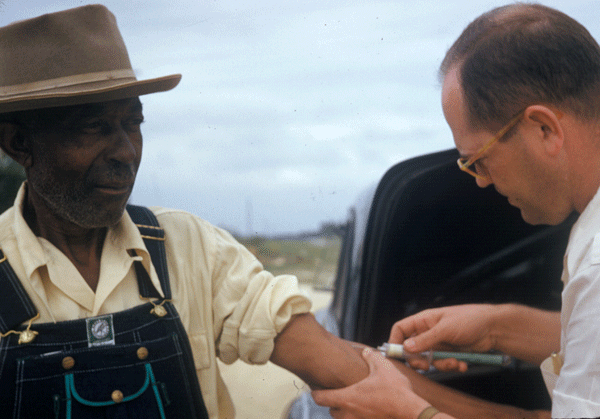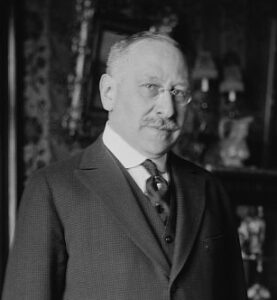
In July 1972, AP reporter Jean Heller exposed a 40-year federal experiment that left hundreds of Black men in rural Alabama with untreated syphilis for decades, even after a cure became widely available. Participants were left in the dark about their diagnoses and the purpose of the study.
The now-infamous Tuskegee Syphilis Study, started by the U.S. Public Health Service in 1932 to study the effects of the disease when left untreated, killed 128 patients, infected 40 of their wives and caused 19 babies to be born with congenital syphilis. The men and their families won a $10 million settlement in the aftermath of Heller’s article, and in 1974 Congress passed laws regulating how research participants are treated. Former President Bill Clinton issued a formal apology for the study in 1997.
Many Americans know the story of the Tuskegee Syphilis Study, but most are likely unaware of the Julius Rosenwald Fund study, without which the Tuskegee study would not have occurred. It’s an investigative story just waiting for an enterprising reporter to dig in and find out whether generations of Black descendants were harmed — not just from Tuskegee, but from the study that set the stage for it.
Retired Air Force Chief Master Sgt. Helen Noel, whose family comes from a rural Tennessee county that was part of the Rosenwald Fund Study, has health problems she believes can be traced back to the study’s mercury-based treatments. The horrific congenital effects of fetal mercury poisoning are well established, and subsequent research has identified multi-generational, epigenetic effects of mercury toxicity.
There’s a paper trail of documents and letters that a reporter could follow, as well as additional documents Noel can provide, but it will require the time, resources and doggedness to determine the true story beneath the official one.
The Rosenwald Fund study

Julius Rosenwald was part owner of Sears Roebuck and a well-known philanthropist in the early 20th Century. After meeting Tuskegee Institute Founder Booker T. Washington in 1911, Rosenwald began funding the construction of schools for Black communities in rural areas, according to the U.S. National Park Service.
After Rosenwald established the Rosenwald Fund in 1917, the program helped build more than 5,000 schoolhouses across 15 states in addition to funding public health projects. One of those projects was “to determine the practicability and effectiveness of measures for mass control of syphilis,” starting with a survey of syphilis prevalence in six rural Southern counties with predominantly Black populations.
However humanitarian Rosenwald’s stated objectives were, there was a deeper motivation in the U.S. in general in his time to better understand the health of Black Southerners. They were a source of “cheap labor resources,” as Benjamin Roy, M.D., writes in “The Julius Rosenwald Fund syphilis seroprevalence studies,” an excellent history on the Fund. Roy writes about the incentive from industry and the Public Health Service to address “the high morbidity and mortality of African Americans” not for their own sake or humanitarian reasons but because “African-American health” was “a means to economic development.”
One of the counties surveyed by the Rosenwald Fund was Alabama’s Macon County, the home of Tuskegee. A high apparent syphilis prevalence there led the Public Health Service to ask Rosenwald to continue funding research for a study at Tuskegee, but the Great Depression had arrived and Rosenwald was cutting back funding. So the Public Health Service, the precursor to today’s CDC, developed its own project to study the long-term effects of untreated syphilis — the Tuskegee Syphilis Study.
The story idea
What happened to the other counties surveyed by the Rosenwald Fund? Helen Noel wants a reporter to investigate this question, and she has several leads.
After reading the three-part series AHCJ published last year reflecting on the 50th anniversary of the Tuskegee Syphilis Study revelations, Helen Noel reached out to AHCJ with a story idea. Noel believes residents in at least one of those counties underwent further experimentation with mercury treatments that have caused health problems in subsequent generations, including to her and her family.
Three pieces of medical history are important to understanding her claim.
First, the justification for withholding treatment from people with syphilis in Tuskegee was that the treatments of the time — before penicillin became widely available in 1945 — were highly toxic. Mercury-based treatments, particularly ointments, were an early treatment for syphilis used since the 16th Century.
Then in 1909, German physician Paul Ehrlich developed an arsenic-based drug called arsphenamine, also called Salvarsan and later Neosalvarsan, that was used until penicillin was discovered. Also used was “malariotherapy,” the intentional injection of malaria parasites to cause high fever. All of these had severe, sometimes fatal, side effects (regardless of this justification, the crime at Tuskegee was that those in the study were not treated even after penicillin became available). The side effects of Salvarsan and Neosalvarsan were not as bad as those from mercury, but these drugs were more expensive and harder to access.
Second, the test used to assess syphilis rates, called the Wassermann test, was notoriously unreliable. The initial test only detected 15% of cases and had a very high rate of false positives, including inaccurate results that could result from other infections, immunity to certain diseases, menstruation at the time of testing, and individuals’ diets. It’s very likely that the high prevalence of syphilis found in the populations surveyed was inaccurate and that many people diagnosed with syphilis didn’t have it.
Third, until penicillin was discovered, the world lacked a standardized, evidence-based regimen for treating syphilis, and the League of Nations had convened a “Committee of Experts on Syphilis and Cognate Subjects” in 1928 to come up with one. This period of time was ripe for experimentation for a disease that carried a substantial public health burden, and it’s known that the Rosenwald Fund treated residents of many of those six Southern rural counties for syphilis.
So, consider the context of the times:
- The Public Health Service, industry, and state and local governments were all economically motivated to ensure Black Americans were healthy enough to provide cheap labor, including treating syphilis.
- A high prevalence of syphilis had been identified from a test with a high false positive rate.
- A standardized regimen for treating syphilis did not yet exist.
- The costs of Salvarsan exceeded those of older, cheaper treatments like mercury ointments.
- A long history existed of using Black people as research subjects without obtaining true informed consent.
- A long history of forced treatment of “venereal disease” existed; a year after Congress established the Division of Venereal Diseases in the U.S. Public Health Service, 44 states had their own bureaus for venereal disease control.
‘Courageous reporter’ wanted
Given those facts and additional research Noel has conducted, concern that the Rosenwald Fund was conducting experimental therapies on Black Southerners diagnosed with syphilis is a reasonable possibility. The problem is, we don’t know what exactly happened — it hasn’t been investigated. But the story is sitting there, waiting for a “courageous reporter,” Noel said, to find out.
Noel has spent more than a decade researching the Rosenwald Fund and has corresponded with multiple federal and international agencies throughout three presidential administrations. Her documentation includes letters from the CDC denying the work of the Fund’s study, from the U.S. Health and Human Services weakly acknowledging the Fund, and the United Nations identifying the Rosenwald Fund Study as a violation of civil and human rights. She can be reached directly at helennoelrosenwald (at) gmail (dot) com.
Resources:
- Control of Syphilis as the Next Public Health Objective, JAMA, 1936
- Mercury-induced epigenetic transgenerational inheritance of abnormal neurobehavior is correlated with sperm epimutations in zebrafish, PLOS ONE, 2017
- Investment in People: the Story of the Julius Rosenwald Fund, 1949
- Guide to the Julius Rosenwald Papers 1905-1963, The University of Chicago Library
- Unraveling the Tuskegee Study of Untreated Syphilis, archives of Internal Medicine, 2000
- The First Syphilis Cure Was the First ‘Magic Bullet’, Smithsonian, 2017
- Syphilis and Salvarsan, British Journal of General Practice, 2019
- Fetal Minamata Disease: A Human Episode of Congenital Methylmercury Poisoning, Handbook of Developmental Neurotoxicology (Second Edition), 2018
- Fisk archives offer window to Rosenwald syphilis study, USA Today, 2014
- The Julius Rosenwald Fund syphilis seroprevalence studies, JAMA, 1996
- The Julius Rosenwald Fund, Journal of Negro Education, 1934
- A Community Enterprise: The Rosenwald Schools of the National Register for Historic Places – Rediscovering Black History, National Archives
- Episode 50: Before Tuskegee: A Journey for Recognition, podcast of Center for Constitutional Rights, 2022
- “Bad Blood”: A Case Study of the Tuskegee Syphilis Project
- Generational trauma: Former Chief reflects on family history of illness, Joint Base Langley-Eustis, 2012
- Penicillin Treatment of Syphilis, JAMA, 2009
- Brief History of Syphilis, Journal of Medicine and Life, 2014
- Syphilis – Its early history and Treatment until Penicillin and the Debate on its Origins, Journal of Military and Veterans’ Health






